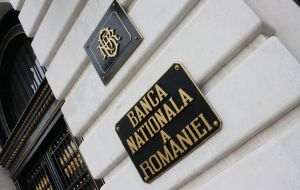Central banks, public pension funds and sovereign investment funds, which hold assets that account for 40% of the GDP of the planet, are buying increasing volumes of stocks listed on the stock exchanges, according to the Global Public Invest 2014 report, made by the Forum of Public Financial and Monetary Institutions (OMFIF).
The 400 entities (157 central banks, 156 public pension funds and 87 sovereign funds) have investments that amount to 29.1 trillion dollars, which turns them into a force on the financial markets, according to the report.
Public investors are in a process of diversifying their investments and searching for new sources of income, amid the drop of the interest rates, caused by the efforts of the central banks to restart the global economy, the authors of the study write.
Various forms of "state capitalism" have appeared, following the financial crisis, the authors say.
According to the calculations of the OMFIF, central banks have lost interest revenues of 200 - 250 billion dollars, as a result of the drop in bond yields, which were partially offset by lower interest payments on liabilities.
Sovereign investors seem to have recently increased their placements in listed stocks by at least 1 trillion dollars recently, according to their report.
Economics professor Bogdan Glăvan considers that these investments increase the ability of the central banks to manipulate the stock markets.
"More specifically, the central banks have come to the point where they themselves are chasing yield, joining the speculative rush for profits, even though they were the ones to lower the profitability of investing in supposedly safe assets in the first place. This is the culmination of the policy of bail-out policy and of the resuscitation of the economy: take control of countries with the financial system and destroy everything that is healthy in it, including the stock market, which is considered the compass of the stock market and the material quintessence of capitalism", he wrote on his blog "Economic Logic".
This development represents nothing more than yet another step on the way towards the nationalization of investments, says Bogdan Glăvan: "So far nobody has nationalized stock market investments. But that has happened to the bank deposits, and more than once in history. I don't have to remind you about Cyprus, Argentina... Well, on the next crisis the suggestion to confiscate the stocks you own will be brought up.
Because if that won't happen then the whole system whose prices are artificially pumped up today thanks to the money printers will collapse under a flood of selling orders. Orders which will be impossible to execute".
• The Fed wants to discourage investing in bonds
The economics professor states that Financial Times (FT) wrote, earlier this week, an article which said that the US Central Bank (Fed) is considering charging redemption fees to investors in bond funds.
The sources quoted by FT write that the Fed officials are worried that the bond funds are turning into "ghost banks", considering that investors can withdraw their money on demand, even though the assets of those funds can be hard to sell in a crisis.
Website ZeroHedge writes, however, that the proposal of the FED does not concern the funds that invest in stocks, which would suggest that the US Central Bank is trying to determine investors to turn to those funds as investment options, to get the price of shares to keep rising once it stops injecting liquidity into the economy.
The authors of the report also warn that the major liquidity surplus of public actors is a double-edged sword.
Their assets have been created in the approach to reduce the effects of the crisis, through interventions on the stock market, in the case of central banks in the emerging economies, and through quantitative easing, in the case of central banks in the developed countries.
Placing those funds on the financial markets can however lead to an increase in the price of assets, which represents a source of additional risk, the OMFIF writes.
"Many of these problems are self-sustaining, as the authorities in charge of preserving the financial stability are often the owners of substantial funds, which have the potential to create problems", the report writes.
The assets of central banks currently amount to 13.2 trillion dollars (including gold). Those of the pension funds amount to 9.4 trillion dollars, and those of sovereign funds to 6.5 trillion dollars, the document notes.
The study advises state-owned investors to adhere to the transparency and responsibility principles which are globally recognized and they suggest the investment of the funds the former have available in areas such as infrastructure, energy and transport. The OMFIF also emphasizes that there is a need to make co-investments, partnerships and systems to allow sharing the knowledge between private and public entities.
The report notes that the cutting of the interest rates by the central banks, amid the economic recession, had a negative effect on the profitability of holding reserves by these institutions, and some of them are worried that being financed from the state budget could affect their independence.
The document also writes that sovereign investors should expect their performance to be evaluated using a significant public interest as a benchmark.
The authors conclude that these institutions must understand and do a better job of managing the political area they will inevitably be attracted towards.
The Official Monetary and Financial Institutions Forum - OMFIF is a think-tank whose stated goal is to facilitate the exchange of opinions between public entities and private players.
The areas it focuses on are the monetary and economic policies, asset management and the oversight and regulation of the financial sector.























































